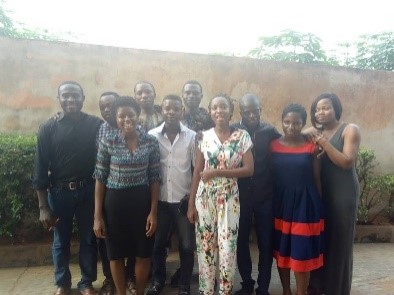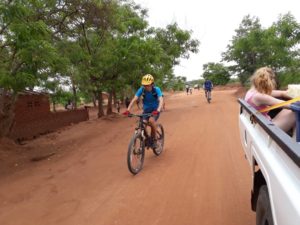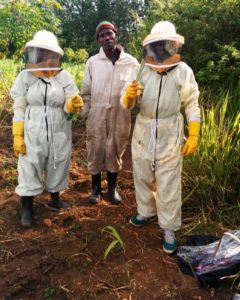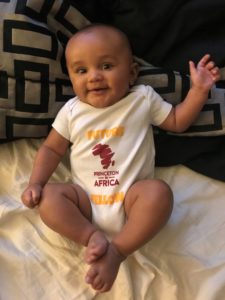January/February 2019
Greetings from the PiAf office! We hope your New Year is off to a great start.
PiAf staff, board and alumni spent the months of December and January interviewing nearly 200 candidates for the 2019-20 cohort of Fellows. It was inspiring to meet these impressive candidates and great to connect with so many members of the PiAf family. Thanks to all of you who helped with the process, we look forward to introducing you to the 2019-20 PiAf Fellows soon!
The PiAf office is also happy to welcome back, Michelle Spada, our Program Director from her maternity leave. Michelle is a proud mom of a baby boy, Muhajir! Look below for an adorable photo of him in our PiAf onesie.
On another note, our annual photo contest has concluded and photo entries are now on our facebook page here. Entries capture both work-related and non-work related events. To vote you can simply like the photo on PiAf’s facebook page. Please make sure to like the original photo post, as likes on reshares will not be counted.
We hope you enjoy this edition of the Fellows Flyer. See you in the spring, when we will share updates from our upcoming visits to nine of our host countries and our midyear Leadership Retreat!
PiAf Connections
Please click below to check out pictures of our Fellows, Alums and other members of the PiAf family meeting up at home and around Africa.
Notes from the Field
By Cynthia Joseph, 2018-19 Fellow with African School of Economics in Benin
Kwabo! I have been living in Abomey-Calavi, Benin for the past six months and it has been a challenging, yet rewarding experience. I serve as a lecturer in English and Assistant of Academic Affairs at the African School of Economics, but the most stimulating aspect has been working with the students. I teach beginner and advanced English as well as a GRE/TOEFL class to those who aim to pursue PhD programs abroad. The most recent series of GRE/TOEFL classes consisted of eight hardworking pre-doctoral fellows. I was responsible for teaching them test taking strategies and providing them with materials to help prepare them for the tests. I was scheduled to assist them at least once a week for three hours, but as the test dates neared, we worked several times a week. During this time, I decided to retake the GRE and began to study with my students. It was an honor for me to take the GRE with them; many of us drove to the test location together, we laughed, and ate before taking the test that would essentially determine our futures. Despite the seriousness of the test, all feelings of anxiousness disappeared. In the end, most students improved significantly and were able to apply to PhD programs. I am incredibly proud of the pre-doctoral fellows and would like to thank them for teaching me the importance of persistence and hard work. They are inspiring and have bright futures.
In addition to teaching, I also assist with the communications team, research projects, and organizing conferences. For instance, I have learned more about the impact of certain policies on girls’ education in Benin. There are many researchers working on various interesting projects on education and development, which is what I hope to research in the future. I also had the opportunity to participate in PEGNet, which was a joint conference with a German organization and the African School of Economics on poverty, education, and development. I am extremely passionate about these issues and feel as if I am learning so much at the African School of Economics.
During the second half of my fellowship, I will have the opportunity to participate in more research projects and hope to learn more about data analysis. I would like to continue learning from both my students and coworkers. In terms of personal goals, I hope to become proficient in the local language and discover more of Benin.
Notes from the Field
By Christopher Wayland, 2018-19 Fellow with Foster Lewis in Malawi
Mountain biking is one of my favorite activities, but it is also demanding and unforgiving (particularly in Malawi where its hot and the dirt is hard). Hiking mountains is already strenuous and having to account for an extra 25-pound piece of metal and carbon is borderline insane. Ascending a few thousand feet on dirt roads leaves your thighs burning, lungs bursting, and throat slaking. However, ripping through a flowy single track and maneuvering past rocks and roots, creates an adrenaline rush which, although ephemeral, often recompenses efforts expended on climbing.
While an adventure sport is not the best metaphor for the inherent desultoriness of the quotidian and an office job, some aspects are germane. After spending two post-grad years constructing a social life and establishing myself at work, I hit the reset button in Lilongwe. Additionally, Foster Lewis, the firm I work for, was and still is in the process of transitioning from development consulting to SME financing and technical assistance. Therefore, there were no projects for me to work on when I arrived; instead I had a nebulous set of responsibilities tied to an end-product that wasn’t fully defined. It was as if someone dropped me at the base of Kili with a bike and said see you at the top.
The experience was and still can be frustrating. I’ve learned that it’s difficult to profitably provide financial services to entrepreneurs in developing countries, second hand items are finnicky (especially engines of used cars), and roosters and street dogs do not respect human biological clocks. However, since my first month I have gradually found niches at work and socially. At Foster Lewis, I spent six weeks conducting interviews and generating recommendations for the 5-year strategic plan of the Malawi Investment and Trade Center. With a fellow co-worker I began interviewing interesting Malawian entrepreneurs which we developed into a rudimentary podcast series called Talking Kwacha!. Outside of work I joined organized football (soccer to Americans) and ultimate frisbee games and found running and biking groups.
I even participated in one of the Malawi Winter Mountain Bike events, a series of seven 50km races at various locations across the country. Riding and ascending 3,000 feet through the tea estates at the base of Mt. Mulanje, a majestic 10,000 ft. peak in Southern Malawi, we passed through villages where dozens of spectators cheered us on. It was beautiful; however, for every action there’s an equal and opposite reaction and sure enough the head gasket on my car blew out on the drive back to Lilongwe after the race.
At Foster Lewis we are still working on defining our long-term role in the SME financing space. There are always more hills to climb and aside from rainy season the dirt is red and solid in Malawi.
Notes from the Field
By Gabriella Bragoli, 2018-19 Fellow with the Kasiisi Project in Uganda
Fun Fact: Elephants fear bees. Despite their thick hides, vulnerable ears and trunks make them particularly wary of the low hum of a nearby swarm. This is one of the first things I learned when I arrived at the Kasiisi Farm, about 14 kilometres outside of Fort Portal, Uganda. Along with poultry, pigs, and crops the farm is home to over 50 colonized beehives. On my first trip into the apiary the smell of smoke, honey, and trumpet flowers mingled in the mid-morning light. I followed along as Vallence, our apiary manager, walked between the rows of hives with wisps of smoke trailing behind him. He stopped at Hive 12 and we placed an obnoxiously bright piece of orange duct tape on the side of the box. This would denote the hives containing BroodMinder devices. Each device catalogs, at regular intervals, the internal temperature and humidity of the hives. As I fumbled to open the BroodMinder app through thick leather gloves Vallence began to tell me about the BroodMinder equipped hives in Bigodi. “. . . And what are those hives for?” I asked as Hive 12’s upload began. “They are a part of the fence for the elephants”. I learned that along a stretch of Kibale National Forest a “bee fence” has been constructed in place of trenches or chilli pepper gardens.
We concluded our data collection in the Kasiisi Apiary and made our way to Bigodi so I could see the fence firsthand. Along the border of the forest, a thin wire stretches for about 100 meters with hives suspended every few feet. The use of bees, a natural deterrent of elephants, enables community members to protect their homes from crop-raiding, provide habitat for pollinators, and harvest honey. With our Bigodi data accounted for we concluded our day with the bees. This data not only allows Vallence and I to monitor hive activity, but it is added to BroodMinder’s bank of open source hive data. The Kasiisi Farm is one of over 400 active apiaries on their BeeCounted interactive map. Supporters of the Kasiisi Project and interested beekeepers from around the world have the opportunity to check in on our hives. Every time I upload data from the farm, I marvel at the global collaboration and exchange of information taking place.
This is not the Kasiisi Project’s only use of mobile data sharing technology. Over the past three years, student-led Stove Building Teams have marketed and built over 550 fuel-efficient, low emission cook stoves. These stoves reduce the charcoal use and, therefore, deforestation in communities around Kibale. As a follow-up to the installation of improved cook stoves (ICS), the project is working to employ Sensen emission monitors in some of our ICS equipped homes. The Kasiisi Project has been selected as a finalist in the Solution Search “Climate Change Needs Behavior Change” prize. Help us win $25,0000 to continue our ICS programming by voting at https://solutionsearch.org/entityform/3249
Notes from the Field









